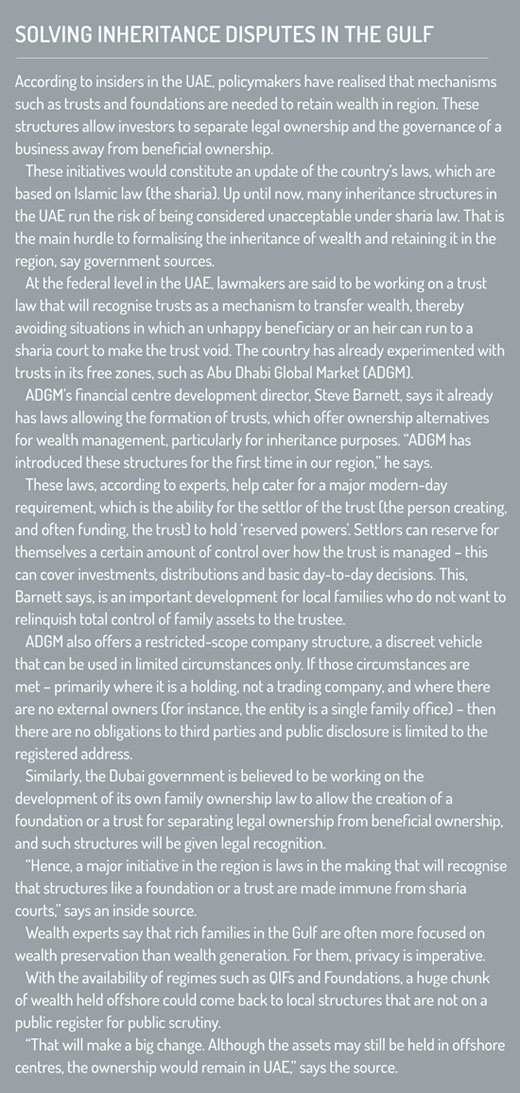Rich Middle Eastern families have long booked their investments abroad. Wealth managers in the UAE want to bring the money home – and they have regulators on their side. Indrajit Basu reports.
Despite their historical preference for managing wealth in global offshore centres, high-net-worth Middle Eastern families are increasingly turning to jurisdictions in the Gulf countries to book their assets.
In the UAE, policymakers are sitting up. With wealth rising, and migration expanding their populations, Abu Dhabi and Dubai have scurried over recent years to adopt global practices and craft new rules to entice wealthy citizens to park their money permanently at home.
But can supportive regulation overcome fears of regional instability, which have encouraged many local people to put their money offshore?
Helpful rules
In August, the Abu Dhabi Global Market (ADGM), an international financial centre, launched its Foundations regime. The idea was to provide an alternative to trusts and corporate vehicles for wealth preservation and management. Although a foundation can be used to provide a platform for financial planning and structuring for anyone, ADGM officials say that families and wealthy individuals from the Gulf countries are the main targets.
The Foundations regime is the latest policy measure in the UAE aimed at attracting wealth back into the region. It follows many efforts from the Dubai International Financial Centre (DIFC), which started back in 2006 with the introduction of a Collective Investment Funds regime to provide investor protection and international standards for regulation.
In the years that followed, the centre’s regulator, the Dubai Financial Services Authority, introduced a raft of new regimes. In 2014, for instance, it launched the Qualified Investor Fund (QIF) regime to counter what it admitted was a “relatively high cost of establishing a fund structure in Dubai”. A lightly regulated fund type aimed at the very wealthy, the QIF regime was viewed as an aggressive measure to entice local wealth away from established funds jurisdictions, such as the Cayman Islands, say experts.
Unlike ADGM’s foundations, which target individual wealth with no minimum investment restriction, QIFs are meant for institutions or individuals who can throw in a minimum of $500,000. Nevertheless, they can be useful for local families to structure their assets within the DIFC, thereby benefiting from a legal structure based on English common law rather than sharia law.
“The QIF is a means for aggregating money for investments into assets in the region. It is an investment platform meant for local families so that they can aggregate some of their local assets in a way so that they can plan lifetime gifting, succession, etc,” says a DIFC source, who requested anonymity.
No more secrets
Indeed, some say the Gulf region is in the midst of an investment renaissance. According to the 2017 ‘GCC Wealth Insight Report’ by Emirates Investment Bank, many rich people in the region are happy to park their money locally. The majority said they had confidence in the stability and security of the local economy, the report said.
Another study, Capgemini’s ‘New World Wealth 2017’, reported a rise in rich people choosing to move to the UAE. Five thousand people with net assets of more than $1 million, excluding the value of their primary homes, moved to the UAE in 2016, up from around 3,000 who moved there in 2015, said the report.
It added that despite the steady decline in oil prices that has nibbled away at wealth, the Middle East was adding more millionaires to its wealthy population. The number of Middle Eastern millionaires rose nearly 5% to 600,000 last year, with their combined wealth rising by an equal proportion to $2.4 trillion.
So, what is driving the return to their homeland?
 “One thing in the world that is changing is the increased scrutiny and public availability of information regarding beneficial ownership of assets held abroad,” says the DIFC source. “To be on a public register, where anybody in the world can look at exactly what I own and where it is, is something a wealthy Middle Eastern investor will not want. So, the UAE has upped its game and is trying to create an environment locally that can match the West in terms of products and service.”
“One thing in the world that is changing is the increased scrutiny and public availability of information regarding beneficial ownership of assets held abroad,” says the DIFC source. “To be on a public register, where anybody in the world can look at exactly what I own and where it is, is something a wealthy Middle Eastern investor will not want. So, the UAE has upped its game and is trying to create an environment locally that can match the West in terms of products and service.”
In short, investors can no longer assume that their offshore accounts are secret. Some offshore markets that were attractive for light taxation, good asset protection and confidentiality are starting to tighten the noose.
For example, in April, the UK tightened the tax advantages for offshore funds by disallowing the subtraction of foreign investors’ fees from their income tax obligations in the UK.
Over the past five years, low-tax offshore centres such as Switzerland, the British Virgin Islands and Guernsey have succumbed to international pressure to be more transparent. Regulation such as the powerful Foreign Account Tax Compliance Act, or Fatca, has helped to force these changes.
Against this background, the UAE has launched supportive regulations intended to appeal to the local market.
“By offering the ability to structure trusts and foundations in ADGM with a local trustee and administrator, ADGM are introducing a new industry to the region which will help retain and manage the relationships and bring the financial centre into the top tier of preferred jurisdictions internationally,” says James Barber-Lomax, director of Abu Dhabi-based PraxisIFM.
It helps that both ADGM and DIFC have a comprehensive double-taxation treaty network that offers significant advantages to local investors with regard to avoiding foreign tax.
“Therefore, as well as trying to repatriate some of the existing relationships for GCC families, the UAE can become a hub for many other jurisdictions,” says Barber-Lomax.
Gulf crisis
However, not everybody is optimistic.
Although private wealth managers acknowledge that regimes such as QIFs and Foundations aim to address the concerns of local investors, they say the measures are not enough by themselves.
One problem is that the region lacks the features of well-developed financial markets, such as mature stock and debt markets and a well-regulated real estate market.
The other hurdle is the slowing economy and the political situation in the region. The recent crisis in Qatar, for instance, has unnerved many prospective local investors (see pages 14-16).
“We tried to launch a new fund in the GCC recently, but raising money was tough because of the political turmoil involving Qatar,” says Himanshu Khandelwal, investment director of Dubai-based Asas Capital, a private wealth management firm focused on the GCC.
“Many local investors trust the regulations on most popular offshore centres, where, even if yields are lower than local yields, they are far less cyclical,” he says.
The other big problem for retaining wealth within the region is that most of the Middle East is still considered an emerging market.
“It is not mature enough,” says Dubai-based wealth manager Abhijit Shah of J Safra Sarasin. “This is why, while our existing clients are interested in the QIF and Foundations regimes, and are studying the advantages of investing under these regimes seriously, not many have started putting in money or bringing it back in the region yet.”
According to Shah, no matter how hard the region’s authorities try to ramp up investment conditions and adopt confidence-building measures, it will be a long and arduous task for the UAE to recapture domestic wealth. Many Gulf citizens will always want to park a big chunk of their wealth abroad as a hedge against regional risks.
Nevertheless, there is widespread agreement that improving regulations and developing the investment infrastructure will help to attract wealth back in the long term.
After all, most of the high-net-worth individuals contacted for the 2017 ‘GCC Wealth Insight Report’ said they were focused on growing their wealth. Their aims are to provide reassurance and security for themselves and their families. The question is where to put that wealth to ensure it is safe.
“The UAE undoubtedly is the bright spot in terms of a regulatory structure for attracting capital in the GCC,” says Shah. “But unfortunately, it is caught in a bad investment cycle.”
©2017 funds global mena

